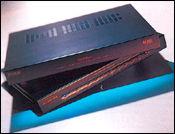| Columns Retired Columns & Blogs |
LATEST ADDITIONS
|
Sep 03, 2000 |
70 comments
You've decided to add a new piece of equipment to your system. Now begins the process of figuring out which make and model you want. How do you test products to make sure you get the right stuff?
What process do you use to compare components?
My comparison process includes:
84% (68 votes)
I don't compare, but buy on instinct.
2% (2 votes)
I don't compare, but buy on recommendations.
14% (11 votes)
Total votes: 81





